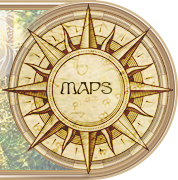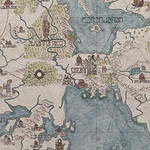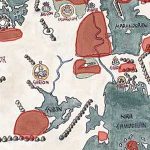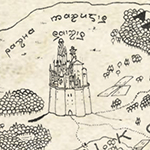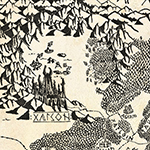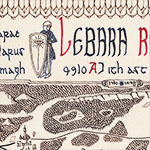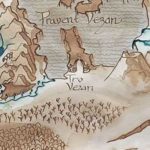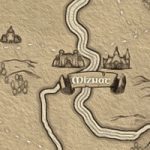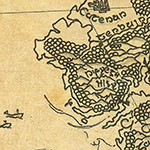The land of Ningor is a hilly inland kingdom of the North, known for its fertile fields and forests. To the north, it borders the territory of Valarkagas and to the south, the militaristic kingdom of Tagaris, with smaller principalities lying on its other sides. Ningor is particularly renowned for its carefully cultivated groves of leafbinders, trees with large leathery leaves used for bookbinding. The people of Ningor are avid readers and, above all, prolific writers. To understand this almost manic activity, it is necessary to delve into the origins and peculiarities of this nation.
The Ningorians are an ancient people, older than most of their neighbors except for Valarkagas. They are also of a different origin. Unlike the Dorn race, they arose long ago from the mingling of the Vezanians and Elves. In the times before the Deluge, the area now known as Ningor was one of the provinces of Ancient Vezan, ruled by Hurdarjuš, a man of mixed heritage. He, like many others of his kind, was troubled by the brevity of his half-elven lifespan. It is said he turned to the masters of magic to extend his life, but they could not help him. Desperate, he is believed to have descended into the Underworld itself—according to the Ningorans it has several entrances within their realm—seeking out a powerful being whose name remains a secret kept among the initiated. The chroniclers of Ningor call this entity simply the “Lord of Names,” or Anumdmuš in the Ningoran tongue. Hurdarjuš pleaded earnestly and promised his people’s eternal reverence in return.

No one knows exactly what transpired in the depths beneath Ningor, but Hurdarjuš returned transformed, and soon other Ningorians of mixed heritage also began to notice changes. What Anumdmuš granted them was a form of conditional immortality: he bound their names intrinsically to their life force. As long as their names were remembered, spoken, or transmitted—whether through writing or oral tradition—they would continue to live. “Making a name for oneself” could be achieved in many ways: scholars named every second discovered material or plant after themselves, generals sought glory through campaigns and victory monuments, talented painters, sculptors and songwriters through their art, but for most people, the most accessible attempt at immortality lay in prolific writing. As long as their books were read, they could live. However, a name had to be known beyond one’s immediate family to anchor their life force.
As the Ningorians discovered the intricacies of the Power of Names, the fall of Ancient Vezan and the Deluge of the World arrived. Ningorian legends say that Hurdarjuš commanded his people to seek refuge from the flood in the Underworld, where he had once ventured. It is said that many survived there and thus were among the first to restore their land after the waters receded. For centuries, they waged war in the North alongside Valarkagas against the deluvial beasts.
Today, Ningor is a land of monuments and a hub of book production. Every Ningorian (except the so-called Resigned Ones) strives tirelessly to preserve their name. Even those with little talent at least copy poetic and narrative themes from Lorino, Xalgon, Uldar, or distant Sirania and Garion, altering details and publishing under their own names. Nearly every second person is a bookbinder, handing out their poetry collections to anyone they meet. If interest in someone’s work wanes, they begin to wither and suffer the ailments of old age.
The wise have noted that this peculiar form of immortality granted to the Ningorans bears similarities both to how the undead of Havdaur maintain their strength and to how gods themselves gather their life force. Like the Ningorians, gods weaken when they lose their worshippers and, if left entirely unremembered, fall into divine coma. For Ningorians, the threshold for survival is higher: around a hundred unrelated individuals must have a personal connection to their name to avoid aging and death. Many ultimately perish, as human memory can carry only so many names beyond the family circle. This drives the Ningorans to a frenzy of productivity, where their reward is not cattle, land, or gold—but the time of their lives.

Together with their peculiar gift come several weaknesses. The greatest weakness is the very close connection between their name and their life force. Ningorians are therefore almost defenseless against magic that exploits the power of names. Their name is so directly tied to their life that a mage does not need to exert any effort to find and seize this bond. Additionally, every Ningorian naturally risks their true name, as immortality cannot be achieved through pseudonyms.
A major issue lies in all kinds of forgeries and falsifications, as well as challenges to the authorship of works. Ningorian society, therefore, has very strict laws against forgery, claiming credit for someone else’s accomplishments, and similar offenses. However, these laws apply only to Ningorians, meaning that plagiarizing foreign works is socially tolerated.
Only in Ningor can someone be murdered or executed by having all their books or paintings burned and their names chiseled off monuments. This is a danger that every conditionally immortal Ningorian fears. Similarly, well-known publishers or storytellers wield immense power, as it is solely by their decision that someone’s work can be removed from circulation, their stories no longer told.
